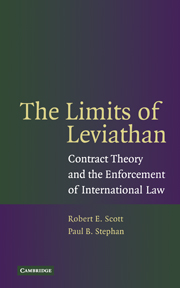Book contents
- Frontmatter
- Contents
- Foreword
- 1 Introduction
- 2 States, Firms, and the Enforcement of International Law
- 3 Lessons from Contract Theory
- 4 A Model of Optimal Enforcement
- 5 Patterns of International Law Enforcement
- 6 The Choice between Formal and Informal Enforcement
- 7 The Future of International Law and Its Enforcement
- Glossary
- Table of Authorities
- Index
3 - Lessons from Contract Theory
Published online by Cambridge University Press: 29 July 2009
- Frontmatter
- Contents
- Foreword
- 1 Introduction
- 2 States, Firms, and the Enforcement of International Law
- 3 Lessons from Contract Theory
- 4 A Model of Optimal Enforcement
- 5 Patterns of International Law Enforcement
- 6 The Choice between Formal and Informal Enforcement
- 7 The Future of International Law and Its Enforcement
- Glossary
- Table of Authorities
- Index
Summary
A treaty is in its nature a contract between two nations, not a legislative act.
Foster v. Neilson, 27 U.S. (2 Pet.) 253, 314 (1829) (Marshall, C.J.)International law comprises a system of norms, customs, rules, treaties, and agreements that purports to govern the behavior of nation states toward their citizens, other states, and other states' citizens. The very breadth of international law frustrates categorization. At some level of abstraction, any generalizations about the purposes and functions of international law cannot avoid gross oversimplification. But some themes run through the field, even if they do not explain every aspect of the system.
Although nations may conform their behavior to international rules and norms for many reasons, the animating purpose of much international law is to foster mutually beneficial cooperation among states. Although the subject matter of any particular cooperative enterprise may vary greatly – from treaties and customs regarding a private investment agreement to a convention on global warming to the “laws” of war – the fundamental behavior remains the same. International law functions in many instances to encourage nations to cooperate where it is in their mutual self-interest to secure the cooperation of other states, but where deviations from the cooperative goal will secure even greater private advantage to any single defecting state. To solve this conundrum, a primary concern of any system of international law is insuring compliance with the cooperative goal.
- Type
- Chapter
- Information
- The Limits of LeviathanContract Theory and the Enforcement of International Law, pp. 59 - 83Publisher: Cambridge University PressPrint publication year: 2006



